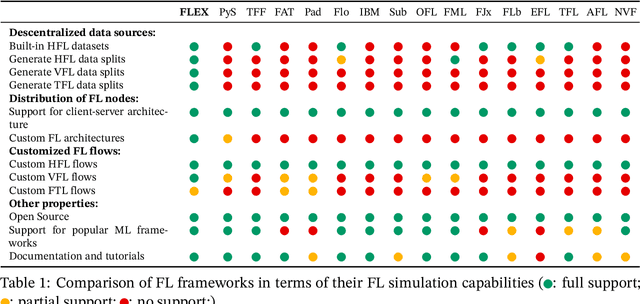Mario García-Márquez
Resilient Federated Chain: Transforming Blockchain Consensus into an Active Defense Layer for Federated Learning
Feb 25, 2026Abstract:Federated Learning (FL) has emerged as a key paradigm for building Trustworthy AI systems by enabling privacy-preserving, decentralized model training. However, FL is highly susceptible to adversarial attacks that compromise model integrity and data confidentiality, a vulnerability exacerbated by the fact that conventional data inspection methods are incompatible with its decentralized design. While integrating FL with Blockchain technology has been proposed to address some limitations, its potential for mitigating adversarial attacks remains largely unexplored. This paper introduces Resilient Federated Chain (RFC), a novel blockchain-enabled FL framework designed specifically to enhance resilience against such threats. RFC builds upon the existing Proof of Federated Learning architecture by repurposing the redundancy of its Pooled Mining mechanism as an active defense layer that can be combined with robust aggregation rules. Furthermore, the framework introduces a flexible evaluation function in its consensus mechanism, allowing for adaptive defense against different attack strategies. Extensive experimental evaluation on image classification tasks under various adversarial scenarios, demonstrates that RFC significantly improves robustness compared to baseline methods, providing a viable solution for securing decentralized learning environments.
Improving $(α, f)$-Byzantine Resilience in Federated Learning via layerwise aggregation and cosine distance
Mar 27, 2025



Abstract:The rapid development of artificial intelligence systems has amplified societal concerns regarding their usage, necessitating regulatory frameworks that encompass data privacy. Federated Learning (FL) is posed as potential solution to data privacy challenges in distributed machine learning by enabling collaborative model training {without data sharing}. However, FL systems remain vulnerable to Byzantine attacks, where malicious nodes contribute corrupted model updates. While Byzantine Resilient operators have emerged as a widely adopted robust aggregation algorithm to mitigate these attacks, its efficacy diminishes significantly in high-dimensional parameter spaces, sometimes leading to poor performing models. This paper introduces Layerwise Cosine Aggregation, a novel aggregation scheme designed to enhance robustness of these rules in such high-dimensional settings while preserving computational efficiency. A theoretical analysis is presented, demonstrating the superior robustness of the proposed Layerwise Cosine Aggregation compared to original robust aggregation operators. Empirical evaluation across diverse image classification datasets, under varying data distributions and Byzantine attack scenarios, consistently demonstrates the improved performance of Layerwise Cosine Aggregation, achieving up to a 16% increase in model accuracy.
Krum Federated Chain (KFC): Using blockchain to defend against adversarial attacks in Federated Learning
Feb 10, 2025Abstract:Federated Learning presents a nascent approach to machine learning, enabling collaborative model training across decentralized devices while safeguarding data privacy. However, its distributed nature renders it susceptible to adversarial attacks. Integrating blockchain technology with Federated Learning offers a promising avenue to enhance security and integrity. In this paper, we tackle the potential of blockchain in defending Federated Learning against adversarial attacks. First, we test Proof of Federated Learning, a well known consensus mechanism designed ad-hoc to federated contexts, as a defense mechanism demonstrating its efficacy against Byzantine and backdoor attacks when at least one miner remains uncompromised. Second, we propose Krum Federated Chain, a novel defense strategy combining Krum and Proof of Federated Learning, valid to defend against any configuration of Byzantine or backdoor attacks, even when all miners are compromised. Our experiments conducted on image classification datasets validate the effectiveness of our proposed approaches.
FLEX: FLEXible Federated Learning Framework
Apr 09, 2024



Abstract:In the realm of Artificial Intelligence (AI), the need for privacy and security in data processing has become paramount. As AI applications continue to expand, the collection and handling of sensitive data raise concerns about individual privacy protection. Federated Learning (FL) emerges as a promising solution to address these challenges by enabling decentralized model training on local devices, thus preserving data privacy. This paper introduces FLEX: a FLEXible Federated Learning Framework designed to provide maximum flexibility in FL research experiments. By offering customizable features for data distribution, privacy parameters, and communication strategies, FLEX empowers researchers to innovate and develop novel FL techniques. The framework also includes libraries for specific FL implementations including: (1) anomalies, (2) blockchain, (3) adversarial attacks and defences, (4) natural language processing and (5) decision trees, enhancing its versatility and applicability in various domains. Overall, FLEX represents a significant advancement in FL research, facilitating the development of robust and efficient FL applications.
 Add to Chrome
Add to Chrome Add to Firefox
Add to Firefox Add to Edge
Add to Edge